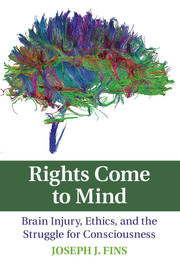Book contents
- Frontmatter
- Dedication
- Epigraph
- Contents
- Miscellaneous Frontmatter
- Acknowledgments
- Introduction
- 1 Decisions
- 2 The Injury
- 3 Coming to Terms with Brain Injury
- 4 The Origins of the Vegetative State
- 5 A Shift since Quinlan
- 6 Maggie's Wishes
- 7 Something Happened in Arkansas
- 8 From PVS to MCS
- 9 Leaving the Hospital
- 10 Heather's Story
- 11 Neuroimaging and Neuroscience in the Public Mind
- 12 Contractures and Contradictions: Medical Necessity and the Injured Brain
- 13 Minds, Monuments, and Moments
- 14 Heads and Hearts, Toil and Tears
- 15 What Do Families Want?
- 16 Deep Brain Stimulation in MCS
- 17 Mending Our Brains, Minding Our Ethics
- 18 It's Still Freedom
- 19 Maggie Is in Town
- 20 When Consciousness Becomes Prosthetic
- 21 The Rights of Mind
- 22 A Call for Advocacy
- Epilogue
- Notes
- In Memoriam
- Index
8 - From PVS to MCS
Published online by Cambridge University Press: 05 September 2015
- Frontmatter
- Dedication
- Epigraph
- Contents
- Miscellaneous Frontmatter
- Acknowledgments
- Introduction
- 1 Decisions
- 2 The Injury
- 3 Coming to Terms with Brain Injury
- 4 The Origins of the Vegetative State
- 5 A Shift since Quinlan
- 6 Maggie's Wishes
- 7 Something Happened in Arkansas
- 8 From PVS to MCS
- 9 Leaving the Hospital
- 10 Heather's Story
- 11 Neuroimaging and Neuroscience in the Public Mind
- 12 Contractures and Contradictions: Medical Necessity and the Injured Brain
- 13 Minds, Monuments, and Moments
- 14 Heads and Hearts, Toil and Tears
- 15 What Do Families Want?
- 16 Deep Brain Stimulation in MCS
- 17 Mending Our Brains, Minding Our Ethics
- 18 It's Still Freedom
- 19 Maggie Is in Town
- 20 When Consciousness Becomes Prosthetic
- 21 The Rights of Mind
- 22 A Call for Advocacy
- Epilogue
- Notes
- In Memoriam
- Index
Summary
A Consensus on PVS
Beyond all the media hype, and faux explications invoking all manner of pseudo-science, how could a patient, like Terry, diagnosed as vegetative for so long, recover so dramatically? There were emerging prognostic rules about such things, and Terry had seemingly broken all of them, regaining consciousness so late in the game. No one came out of the vegetative state after nineteen years. It was impossible, and not what the experts had agreed upon back in 1994 when a definitive set of consensus papers were published in the New England Journal of Medicine by leading representatives of clinical societies concerned with brain states.
Under the banner of a “Multi-Society Task Force,” these expert neurologists, physiatrists, neurosurgeons, and others laid out such parameters about the vegetative state. A central feature of their deliberations was the recognition that brain injuries were not inherently fixed and immutable, but sometimes brain states could, over time, lead to the recovery of consciousness.
They agreed that when a vegetative state continues beyond thirty days, it is described as persistent and that permanence sets in three months after anoxic injury (severe oxygen deprivation) and twelve months after the insult resulted from trauma. Presciently, the authors of the document worried about being too definitive about predictions, accounting for the possibility of both error and ignorance of our future state of knowledge. To their credit, they hedged just a bit on the question of permanence, making it a more probabilistic statement than an outright certainty. In a brilliant distinction they observed that:
As originally defined by Jennett and Plum in 1972, the term “persistent,” when applied to the vegetative state, meant sustained over time; “permanent” meant irreversible. Notwithstanding Jennett and Plum's precise use of language, confusion has arisen over the exact meaning of the term “persistent.” The adjective “persistent” refers only to a condition of past and continuing disability with an uncertain future, whereas “permanent” implies irreversibility. Persistent vegetative state is a diagnosis; permanent vegetative state is a prognosis.
In retrospect, one reason Terry could have breached these categories was diagnostic error. Bryan Jennett, the co-originator of the vegetative state with Dr. Plum, later put it this way, “Some alleged late recoveries might in fact have been late discoveries of earlier recovery.”
- Type
- Chapter
- Information
- Rights Come to MindBrain Injury, Ethics, and the Struggle for Consciousness, pp. 69 - 82Publisher: Cambridge University PressPrint publication year: 2015



